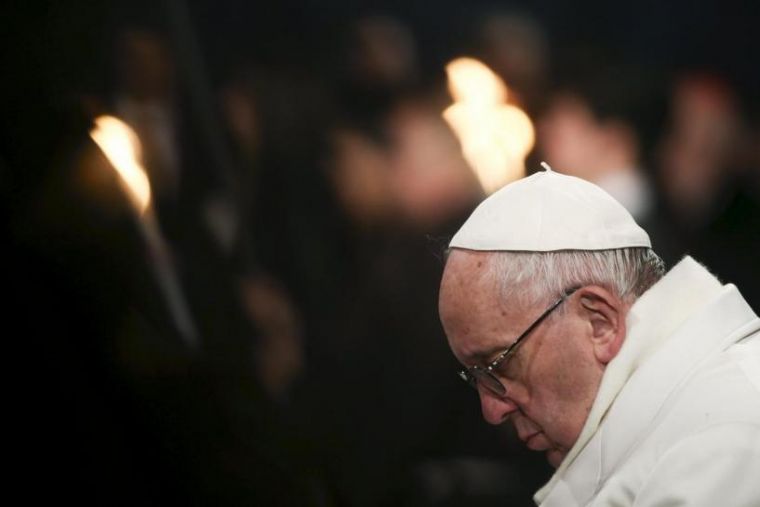Pope Francis is fostering 'confusion' in the Church, says senior Catholic theologian before quitting

A senior Franciscan theologian has resigned his role advising US Catholic bishops on doctrine after writing to the Pope over the summer and attacking the 'chronic confusion' of Francis's pontificate.
Father Thomas Weinandy, a member of the Vatican's International Theological Commission, has resigned his position as a consultant to the United States Conference of Catholic Bishops (USCCB) committee on doctrine, following the publication of a letter written by him to Pope Francis claiming that the current papacy 'fosters within the faithful a growing unease'.
Weinandy, who previously served as executive director of the USCCB's Secretariat for Doctrine, sent the five-page letter to Pope Francis on July 31. Weinandy told the Catholic news website Crux that he sent the letter after a powerful experience of discernment convinced him that 'Jesus wanted me to write something' that would 'be of help to Pope Francis, to the Church, and to the faithful'.
Yesterday James Rogers, the chief communications officer of the USCCB, said that 'after speaking with the General Secretary of the Conference today, Father Thomas Weinandy...has resigned, effective immediately, from his position as consultant to the USCCB Committee on Doctrine. The work of the Committee is done in support of, and in affective collegiality with, the Holy Father and the Church in the United States. Our prayers go with Father Weinandy as his service to the Committee comes to a close.'
Weinandy's letter, which was published by Crux yesterday, made five claims: the Pope's pontificate had fostered confusion, diminished the importance of doctrine in the Church's life, appointed bishops who teach and act in harmful ways, fostered a culture of fear among bishops, and caused faithful Catholics to lose confidence in the papacy.
Weinandy also expressed his 'love for the Church and sincere respect' for the office of the Pope and said he hoped that by recognising 'darkness, the Church will will humbly need to renew herself, and so continue to grow in holiness'.
Father Thomas Petri, the academic dean of the pontifical faculty of the Immaculate Conception at the Dominican House of Studies in Washington, DC, told the Catholic News Agency (CNA) that Weinandy 'is a theologian of the highest caliber' and that the 'letter to His Holiness is quite obviously written with a deep filial piety and loyalty to both our Holy Father Pope Francis and to the Church'.
Petri added: 'I think, charitably what he believes is on many people's minds. Many priests are confronted daily by members of the lay faithful expressing confusion and concern in reports they read or hear about Pope Francis and his advisers.'
Chad Pecknold, professor of theology at the Catholic University of America, agreed, saying Weinandy 'is arguably the most distinguished Franciscan theologian working in the English language today'. Pecknold told the CNA: 'He is a theologian centered in the Church, and not at all at her outermost fringe. So his letter carries the weight of the center.
'Rather than presume to correct, Father Weinandy describes the current situation, and informs the Holy Father that what seems to many like 'intentionally ambiguous' teaching has led to confusion, leading some of his own advisers to publicly advance error....There is something admirable about the impassioned plea of a son of St Francis writing to Pope Francis, in truth and love, as a son to a father. His love for the Pope is evident throughout his appeal.'
Pecknold called Weinandy's letter 'deferential,' but nonetheless told the CNA that 'it is certainly reasonable to ask whether it should have been published in the media'.
Jacob Wood, theology professor at the Franciscan University of Steubenville, expressed a similar concern. 'If Father Weinandy's intention is fraternal correction, publishing his letter might not be the best way to go about it,' Wood told the CNA. 'It is easy for our intentions to get warped when treated in the mass media by people who don't share the perspective of faith. There does exist some danger of scandal.'
Cardinal Daniel DiNardo, the president of the USCCB, issued a statement yesterday afternoon 'on the nature of dialogue within the Church' which he said was brought about by the publication of Weinandy's letter and his resignation. DiNardo said that theological debates are often the subject of media attention, which 'is to be expected and is often good'.
However, DiNardo added that theologians and bishops should make every effort to interpret the Holy Father's teaching charitably, and that all Catholics should 'acknowledge that legitimate differences exist' among Catholics, 'and that it is the work of the Church, the entire body of Christ, to work towards an ever-growing understanding of God's truth'.











